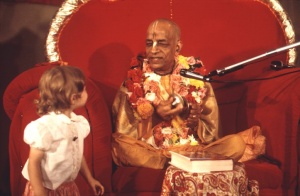SB 10.71.16: Difference between revisions
m (1 revision(s)) |
(Vanibot #0018 edit: make synonym terms in Sanskrit italic in SB - Vanisource) |
||
| Line 1: | Line 1: | ||
{{info | {{info | ||
|speaker= | |speaker=Śukadeva Gosvāmī | ||
|listener=King | |listener=King Parīkṣit | ||
}} | }} | ||
[[Category:Srimad-Bhagavatam - Canto 10 Chapter 71]] | |||
[[Category:Bhagavatam Verses Spoken by Sukadeva Gosvami - Vanisource|107116]] | |||
<div style="float:left">'''[[Srimad-Bhagavatam]] - [[SB 10|Tenth Canto]] - [[SB 10.71: The Lord Travels to Indraprastha|Chapter 71: The Lord Travels to Indraprastha]]'''</div> | |||
<div style="float:right">[[File:Go-previous.png|link=SB 10.71.15]] '''[[SB 10.71.15]] - [[SB 10.71.17]]''' [[File:Go-next.png|link=SB 10.71.17]]</div> | |||
{{RandomImage}} | |||
{{SBnotice}} | |||
==== TEXT 16 ==== | ==== TEXT 16 ==== | ||
<div | <div class="verse"> | ||
naroṣṭra-go-mahiṣa-kharāśvatary-anaḥ | :naroṣṭra-go-mahiṣa-kharāśvatary-anaḥ | ||
kareṇubhiḥ parijana-vāra-yoṣitaḥ | :kareṇubhiḥ parijana-vāra-yoṣitaḥ | ||
sv-alaṅkṛtāḥ kaṭa-kuṭi-kambalāmbarādy- | :sv-alaṅkṛtāḥ kaṭa-kuṭi-kambalāmbarādy- | ||
upaskarā yayur adhiyujya sarvataḥ | :upaskarā yayur adhiyujya sarvataḥ | ||
</div> | </div> | ||
| Line 17: | Line 22: | ||
==== SYNONYMS ==== | ==== SYNONYMS ==== | ||
<div | <div class="synonyms"> | ||
''nara''—by human carriers; ''uṣṭra''—camels; ''go''—bulls; ''mahiṣa''—buffalo; ''khara''—donkeys; ''aśvatarī''—mules; ''anaḥ''—bullock carts; ''kareṇubhiḥ''—and female elephants; ''parijana''—of the household; ''vāra''—and of public use; ''yoṣitaḥ''—the women; ''su-alaṅkṛtāḥ''—well decorated; ''kaṭa''—made of grass; ''kuṭi''—huts; ''kambala''—blankets; ''ambara''—clothing; ''ādi''—and so on; ''upaskarāḥ''—whose paraphernalia; ''yayuḥ''—they went; ''adhiyujya''—having loaded; ''sarvataḥ''—on all sides. | |||
</div> | </div> | ||
{{SBcollapse}} | |||
==== TRANSLATION ==== | ==== TRANSLATION ==== | ||
<div | <div class="translation"> | ||
On all sides proceeded finely adorned women-attendants of the royal household, as well as courtesans. They rode on palanquins and camels, bulls and buffalo, donkeys, mules, bullock carts and elephants. Their conveyances were fully loaded with grass tents, blankets, clothes and other items for the trip. | On all sides proceeded finely adorned women-attendants of the royal household, as well as courtesans. They rode on palanquins and camels, bulls and buffalo, donkeys, mules, bullock carts and elephants. Their conveyances were fully loaded with grass tents, blankets, clothes and other items for the trip. | ||
</div> | </div> | ||
| Line 31: | Line 36: | ||
==== PURPORT ==== | ==== PURPORT ==== | ||
<div | <div class="purport"> | ||
Śrīla Viśvanātha Cakravartī explains that the household attendants mentioned here included washerwomen and other helpers. | Śrīla Viśvanātha Cakravartī explains that the household attendants mentioned here included washerwomen and other helpers. | ||
</div> | </div> | ||
__NOTOC__ | </div> | ||
</div> | |||
<div style="float:right">[[File:Go-previous.png|link=SB 10.71.15]] '''[[SB 10.71.15]] - [[SB 10.71.17]]''' [[File:Go-next.png|link=SB 10.71.17]]</div> | |||
__NOTOC__ | |||
__NOEDITSECTION__ | |||
Revision as of 18:33, 1 December 2017

A.C. Bhaktivedanta Swami Prabhupada
Please note: The synonyms, translation and purport of this verse were composed by disciples of Śrīla Prabhupāda
TEXT 16
- naroṣṭra-go-mahiṣa-kharāśvatary-anaḥ
- kareṇubhiḥ parijana-vāra-yoṣitaḥ
- sv-alaṅkṛtāḥ kaṭa-kuṭi-kambalāmbarādy-
- upaskarā yayur adhiyujya sarvataḥ
SYNONYMS
nara—by human carriers; uṣṭra—camels; go—bulls; mahiṣa—buffalo; khara—donkeys; aśvatarī—mules; anaḥ—bullock carts; kareṇubhiḥ—and female elephants; parijana—of the household; vāra—and of public use; yoṣitaḥ—the women; su-alaṅkṛtāḥ—well decorated; kaṭa—made of grass; kuṭi—huts; kambala—blankets; ambara—clothing; ādi—and so on; upaskarāḥ—whose paraphernalia; yayuḥ—they went; adhiyujya—having loaded; sarvataḥ—on all sides.
Translation and purport composed by disciples of Śrīla Prabhupāda
TRANSLATION
On all sides proceeded finely adorned women-attendants of the royal household, as well as courtesans. They rode on palanquins and camels, bulls and buffalo, donkeys, mules, bullock carts and elephants. Their conveyances were fully loaded with grass tents, blankets, clothes and other items for the trip.
PURPORT
Śrīla Viśvanātha Cakravartī explains that the household attendants mentioned here included washerwomen and other helpers.